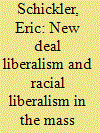| Srl | Item |
| 1 |
ID:
121591


|
|
|
|
|
| Publication |
2013.
|
| Summary/Abstract |
Few transformations have been as important in American politics as the incorporation of African Americans into the Democratic Party over the course of the 1930s-60s and the Republican Party's growing association with more conservative positions on race-related policies. This paper traces the relationship between New Deal economic liberalism and racial liberalism in the mass public. A key finding is that by about 1940, economically-liberal northern white Democratic voters were substantially more pro-civil rights than were economically-conservative northern Republican voters. While partisanship and civil rights views were unrelated among southern whites, economic conservatives were more racially conservative than their economically liberal counterparts, even in the south. These findings suggest that there was a connection between attitudes towards the economic programs of the New Deal and racial liberalism early on, well before national party elites took distinct positions on civil rights. Along with grassroots pressure from African American voters who increasingly voted Democratic in the 1930s-40s, this change among white voters likely contributed to northern Democratic politicians' gradual embrace of civil rights liberalism and Republican politicians' interest in forging a coalition with conservative white southerners. In attempting to explain these linkages, I argue that the ideological meaning of New Deal liberalism sharpened in the late 1930s due to changes in the groups identified with Roosevelt's program and due to the controversies embroiling New Dealers in 1937-38.
|
|
|
|
|
|
|
|
|
|
|
|
|
|
|
|
| 2 |
ID:
192962


|
|
|
|
|
| Summary/Abstract |
Liberal democracies politicize racist incidents at the expense of institutionalizing antiracist ideologies through party politics. This article is concerned with how racial experience shapes how people come to ‘know the political’ in Ceuta, a Spanish city on the Spanish-Moroccan borderland. Knowing the political is an embodied form of subjectivity that makes meaningful sense out of governmental politics as an extension of social life. After examining racial experiences in the lives of Muslim politicians and their supporters, the article examines how the UDCE, a political party primarily composed of Muslims, practices and articulates political ideologies shaped by their experiences as Muslims in Ceuta. Popular and political reactions to the UDCE’s political interventions reveal social unease with racialized peoples conducting political affairs as racialized peoples. This unease, in turn, is rooted in broader sociocultural and historical processes that exclude racial experience from the core practices and ideologies of liberal democratic governance.
|
|
|
|
|
|
|
|
|
|
|
|
|
|
|
|
| 3 |
ID:
102121


|
|
|
|
|
| Publication |
2011.
|
| Summary/Abstract |
In 1965, Daniel Patrick Moynihan, then an official in the Johnson administration, published The Negro Family: The Case for National Action, better known as the Moynihan Report. He was influenced by his participation in two conferences organized by the American Academy of Arts and Sciences in the mid-1960s, as well as two issues of its journal Dceda-lus, on the topic of "The Negro American." Arguing that the "damaged" family structure of African Americans would impede efforts to achieve full racial equality in the United States, the Moynihan Report launched an explosive debate that helped fracture a fragile liberal consensus on civil rights. Geary examines the report alongside the Dcedalus project, establishing its roots in the racial liberalism of the mid-1960s and connecting it to efforts by liberals to address the socioeconomic dimensions of racial inequality. He considers the close relationship between scholarship and public policy that existed at the time and reflects on the ways liberal ideas about race have changed in the decades since.
|
|
|
|
|
|
|
|
|
|
|
|
|
|
|
|